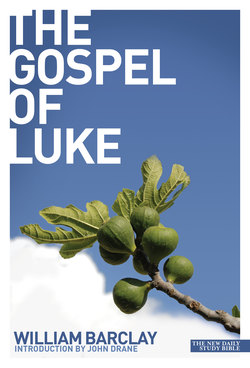Читать книгу Gospel of Luke - William Barclay - Страница 16
На сайте Литреса книга снята с продажи.
ОглавлениеGOD’S MESSAGE TO MARY
Luke 1:26–38
In the sixth month the angel Gabriel was sent from God to a town of Galilee called Nazareth, to a maiden who was betrothed to a man called Joseph, who belonged to the house of David. The maiden’s name was Mary. He came in to her and said, ‘Greetings, most favoured one. The Lord is with you.’ She was deeply moved at this word and wondered what a greeting like that could mean. The angel said to her, ‘Do not be afraid, Mary, for you have found favour in God’s sight. Look you – you will conceive and you will bear a son and you must call him by the name of Jesus. He will be great and he will be called the Son of the Most High; and the Lord God will give him the throne of David his father; and he will rule over the house of Jacob forever, and there will be no end to his kingdom.’ Mary said to the angel, ‘How can this be since I do not know a man?’ The angel answered, ‘The Holy Spirit will come upon you and the Spirit of the Most High will overshadow you, and so the child who will be born will be called holy, the Son of God, and – look you – Elizabeth, too, your kinswoman has also conceived in her old age; and this is now the sixth month for her who is called barren, because there is nothing which is impossible with God.’ Mary said, ‘I am the Lord’s servant. Whatever he says, I accept.’ And the angel went away from her.
MARY was betrothed to Joseph. Betrothal lasted for a year and was quite as binding as marriage. It could be dissolved only by divorce. Should the man to whom a girl was betrothed die, in the eyes of the law she was a widow. In the law there occurs the strange-sounding phrase, ‘a virgin who is a widow’.
In this passage we are face to face with one of the great controversial doctrines of the Christian faith – the virgin birth. The Church does not insist that we believe in this doctrine. Let us look at the reasons for and against believing in it, and then we may make our own decision.
There are two great reasons for accepting it.
(1) The literal meaning of this passage, and still more of Matthew 1:18–25, clearly is that Jesus was to be born of Mary without a human father.
(2) It is natural to argue that if Jesus was, as we believe, a very special person, he would have a special entry into the world.
Now let us look at the things which may make us wonder if the story of the virgin birth is to be taken as literally as all that.
(1) The genealogies of Jesus both in Luke and in Matthew (Luke 3:23–38; Matthew 1:1–17) trace the genealogy of Jesus through Joseph, which is strange if Joseph was not his real father.
(2) When Mary was looking for Jesus on the occasion that he lingered behind in the Temple, she said, ‘Your father and I have been searching for you in great anxiety’ (Luke 2:48). The name father is definitely given by Mary to Joseph.
(3) Repeatedly Jesus is referred to as Joseph’s son (Matthew 13:55; John 6:42).
(4) The rest of the New Testament knows nothing of the virgin birth. True, in Galatians 4:4 Paul speaks of Jesus as ‘born of woman’. But this is the natural phrase for any human being (cf. Job 14:1, 15:14, 25:4).
But let us ask, ‘If we do not take the story of the virgin birth literally, how did it arise?’ The Jews had a saying that in the birth of every child there are three partners – the father, the mother and the Spirit of God. They believed that no child could ever be born without the Spirit. And it may well be that the New Testament stories of the birth of Jesus are lovely, poetical ways of saying that, even if he had a human father, the Holy Spirit of God was operative in his birth in a unique way.
In this matter we may make our own decision. It may be that we will desire to cling to the literal doctrine of the virgin birth; it may be that we will prefer to think of it as a beautiful way of stressing the presence of the Spirit of God in family life.
Mary’s submission is a very lovely thing. ‘Whatever God says, I accept.’ Mary had learned to forget the world’s commonest prayer – ‘Your will be changed’ – and to pray the world’s greatest prayer – ‘Your will be done.’
